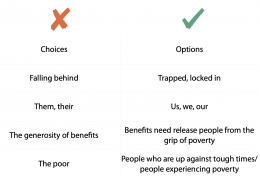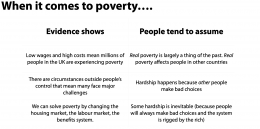
I drafted this a few days ago but much has happened in the meantime. However, the sentiments expressed apply even more as we face the present crisis so let’s reflect on the needs of those who are poor and vulnerable at this time and reach out to help in any way we can.
Those who are poor
For many years I have sought to refer to people living in poverty not as ‘the poor’ but as ‘people who are poor or in need’. First and foremost they are people – not a problem! I personally would not like to be identified to as ‘the short-sighted’; my identity should not be defined by my limitations but by my name, personality, attributes etc. Similarly, those who are disabled do not like to be called ‘the disabled’.
I acknowledge that the Bible refers often to the poor as such eg ‘The Lord has anointed me to bring good news to the poor’ (Is 61:1), ‘For you always have the poor with you’ (Matt 26:11). So I am not going to fight scripture. But I state my preference and challenge you not to categorise people by their outward appearance or circumstances. See the inner man or woman that God sees with all the potential he saw in them when he created them, and give them the dignity of being people made in God’s image.
Watch your language
With these thoughts in mind I was particularly grateful to be invited to take part in a symposium led by Jubilee+ and the Joseph Rowntree Foundation recently where, among other topics, this issue of terminology was addressed. It is so easy to slip into sloppy ways and use inappropriate terminology which carries negative implications, thus, without intending to do so, to convey a superior attitude to those we are seeking to stand alongside in their time of need. Let me illustrate from one of the slides used by the speaker which shows words we often use and offers more appropriate terminology.

Dig deeper
Poverty carries a stigma which is often easily communicated by the way we make assumptions. A good friend of mine has recently needed to seek council-provided accommodation. The attitude of the local government employee has been disgraceful displaying a total lack of empathy, a forceful imposition of her own opinion mixed, I suspect, with more than a touch of racism. This friend is in fact very resourceful, well qualified and through circumstances outside their control has hit a very challenging time of life. But the attitude of the ‘official’ was one of belittling and implied blame.
Let’s always be prepared to look beneath the surface and to see if the underlying root to the particular problem can be identified. Let’s be careful to avoid dealing only with the conspicuous symptoms of poverty or need and try to go ‘upstream’ to deal with the root cause, where possible.
How we express ourselves can so easily reinforce this attitude. Let me illustrate this with another slide used by the speaker from the JRF.

The Bible teaches us to give a cup of water to those who are in need. Or to bind up wounds and not walk past on the other side. This may be particularly pertinent at this time with the Covid19 situation. Let’s be those who are on the alert to the needs of others and demonstrate love both in words and practical ways.
